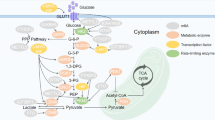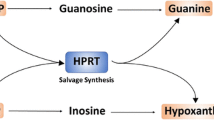Abstract
The abnormal growth properties of cancer cells must be mediated finally by changes in specific metabolic pathways. In general, malignant transformation is associated with an increase in the activities of enzymes involved in DNA, RNA, and protein synthesis, and a concomitant decrease in the activities of enzymes that degrade cellular metabolites. However, no specific metabolic pathway has been found that distinguishes normal from malignant cells, or is common to all tumors.
Access this chapter
Tax calculation will be finalised at checkout
Purchases are for personal use only
Preview
Unable to display preview. Download preview PDF.
Similar content being viewed by others
References
J. I. Toohey, Methylthio group cleavage from methylthioadenosine. Description of an enzyme and its relationship to the methylthiorequirement of certain cells in culture, Biochem.Biophys.Res.Commun. 78: 1273 (1977).
R-L. Pajula, and A. Raina, Methylthioadenosine, a potent inhibitor of spermine synthase from rat brain, FEBS Lett. 99: 343 (1979).
H. G. Williams-Ashman, J. Seidenfeld, and P. Galletti, Trends in the biochemical pharmacology of 5′-deoxy-5′-methylthioadenosine, Biochem.Pharmacol. 31: 277 (1982).
N. Kamatani, W. A. Nelson-Rees, and D. A. Carson, Selective killing of human malignant tumor cells deficient in methylthioadenosine phosphorylase, a purine metabolic enzyme, Proc.Natl.Acad.Sci.USA 78: 1219 (1981).
N. Kamatani, A. L. Yu, and D. A. Carson, Deficiency of methylthioadenosine phosphorylase in human leukemic cells in vivo, Blood 60: 1387 (1982).
C. J. Carrera, R. L. Eddy, T. B. Shows, and D. A. Carson, Assignment of the gene for methylthioadenosine phosphorylase to human chromosome 9 by mouse-human somatic cell hybridization, Proc.Natl.Acad.Sci.USA 81: 2665 (1984).
R. R. Chilcote, E. Brown, and J. D. Rowley, Lymphoblastic leukemia with lymphomatous features associated with abnormalities of the short arm of chromosome 9, N.Engl.J.Med. 313: 286 (1985).
M. Kubota, N. Kamatani, and D. A. Carson, Biochemical genetic analysis of the role of methylthioadenosine phosphorylase in a murine lymphoid cell line, J.Biol.Chem. 258: 7288 (1983).
T. Iizasa, and D. A. Carson, Differential regulation of polyamine synthesis and transmethylation reactions in methylthioadenosine phosphorylase deficient mammalian cells, Biochim.Biophys.Acta 844: 280 (1985).
A. E. Pegg, and P. P. McCann, Polyamine metabolism and function, Am.J.Phvsiol. 243: C212 (1982).
M. Kubota, E. O. Kajander, and D. A. Carson, Independent regulation of ornithine decarboxylase and S-adenosylmethionine decarboxylase in methylthioadenosine phosphorylase-deficient malignant murine lymphoblasts, Cancer Res. 45: 3567 (1985).
E. O. Kajander, M. Kubota, C. J. Carrera, J. A. Montgomery, and D. A. Carson, Resistance to multiple adenine nucleoside and methionine analogs in mutant lymphoma cells with enlarged S-adenosylmethionine pools, Cancer Res. 46: 2866 (1986).
H. Yamanaka, E. O. Kajander, and D. A. Carson, Modulation of diphthamide synthesis by 5′-deoxy-5′-methylthioadenosine in murine lymphoma cells, Biochim.Biophys.Acta 888: 157 (1986).
H. Yamanaka, M. Kubota, and D. A. Carson, Synergistic inhibition of polyamine synthesis and growth by difluoromethylornithine plus methylthioadenosine in methylthioadenosine phosphorylase-deficient murine lymphoma cells, Cancer Res. 47: 1771 (1987).
D. A. Carson, E. H. Willis, and N. Kamatani, Metabolism to methionine and growth stimulation by 5′-methy1thioadenosine and 5′-methylthioinosine in mammalian cells, Biochem.Biophys.Res.Commun. 112: 391 (1983).
Author information
Authors and Affiliations
Editor information
Editors and Affiliations
Rights and permissions
Copyright information
© 1988 Plenum Press, New York
About this chapter
Cite this chapter
Carson, D.A., Nobori, T., Kajander, E.O., Carrera, C.J., Kubota, M., Yamanaka, H. (1988). Methylthioadenosine (MeSAdo) Phosphorylase Deficiency in Malignancy. In: Zappia, V., Pegg, A.E. (eds) Progress in Polyamine Research. Advances in Experimental Medicine and Biology, vol 250. Springer, Boston, MA. https://doi.org/10.1007/978-1-4684-5637-0_16
Download citation
DOI: https://doi.org/10.1007/978-1-4684-5637-0_16
Publisher Name: Springer, Boston, MA
Print ISBN: 978-1-4684-5639-4
Online ISBN: 978-1-4684-5637-0
eBook Packages: Springer Book Archive




